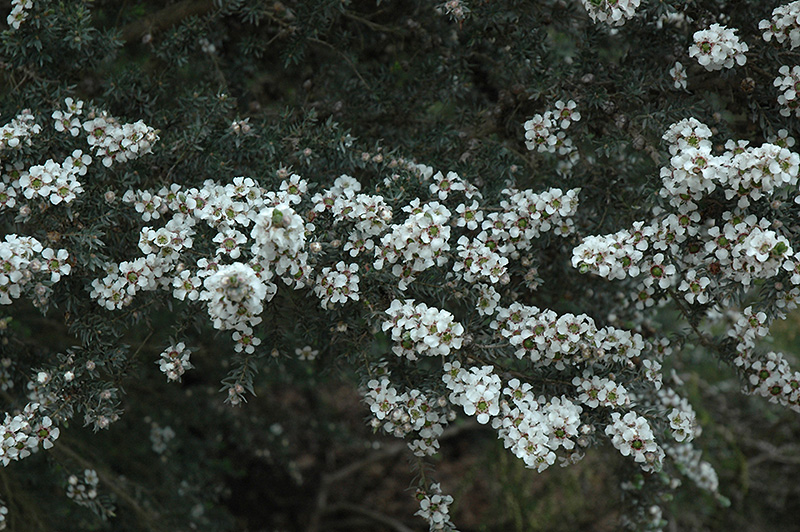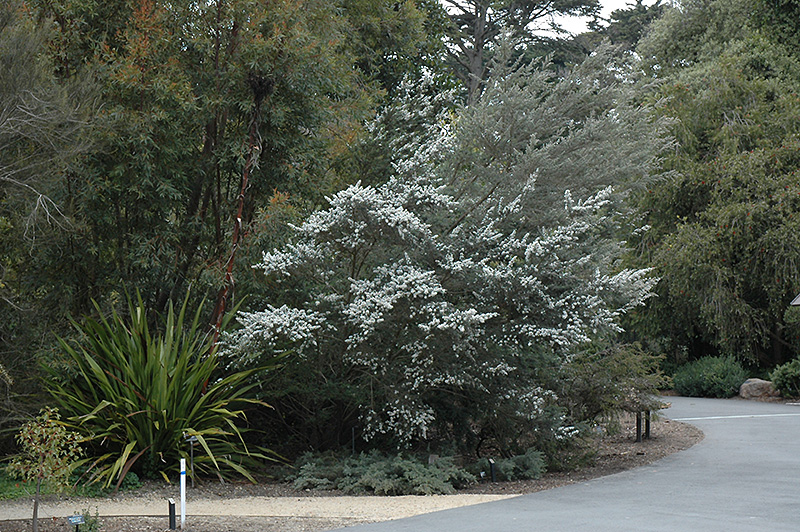Height: 9 feet
Spread: 9 feet
Sunlight:
![]()
![]()
Hardiness Zone: 8
Other Names: Silky Tea-tree, Manuka
Description:
With its gray-green foliage and apple-blossom flowers, this drought tolerant plant makes a pleasing hedge or utility plant on dry sites; prune to avoid seed from spreading; stems make nice cutflowers; not to be confused with Melaleuca, Tea-Tree
Ornamental Features
Woolly Tea-Tree is covered in stunning white flowers along the branches from late spring to early summer. The flowers are excellent for cutting. It has attractive grayish green evergreen foliage. The small fuzzy oval leaves are highly ornamental and remain grayish green throughout the winter.
Landscape Attributes
Woolly Tea-Tree is a dense multi-stemmed evergreen shrub with an upright spreading habit of growth. Its relatively fine texture sets it apart from other landscape plants with less refined foliage.
This is a relatively low maintenance shrub, and should only be pruned after flowering to avoid removing any of the current season's flowers. It has no significant negative characteristics.
Woolly Tea-Tree is recommended for the following landscape applications;
- Mass Planting
- Hedges/Screening
- General Garden Use
- Container Planting
Planting & Growing
Woolly Tea-Tree will grow to be about 9 feet tall at maturity, with a spread of 9 feet. It tends to be a little leggy, with a typical clearance of 1 foot from the ground, and is suitable for planting under power lines. It grows at a medium rate, and under ideal conditions can be expected to live for approximately 20 years.
This shrub does best in partial shade to shade. It prefers dry to average moisture levels with very well-drained soil, and will often die in standing water. It is considered to be drought-tolerant, and thus makes an ideal choice for xeriscaping or the moisture-conserving landscape. It is not particular as to soil type, but has a definite preference for acidic soils. It is somewhat tolerant of urban pollution, and will benefit from being planted in a relatively sheltered location. This species is not originally from North America.
Woolly Tea-Tree makes a fine choice for the outdoor landscape, but it is also well-suited for use in outdoor pots and containers. Its large size and upright habit of growth lend it for use as a solitary accent, or in a composition surrounded by smaller plants around the base and those that spill over the edges. It is even sizeable enough that it can be grown alone in a suitable container. Note that when grown in a container, it may not perform exactly as indicated on the tag - this is to be expected. Also note that when growing plants in outdoor containers and baskets, they may require more frequent waterings than they would in the yard or garden. Be aware that in our climate, this plant may be too tender to survive the winter if left outdoors in a container. Contact our experts for more information on how to protect it over the winter months.


